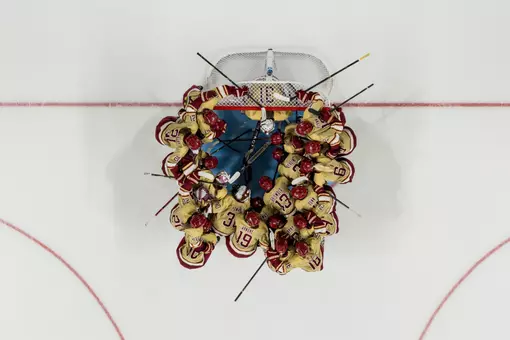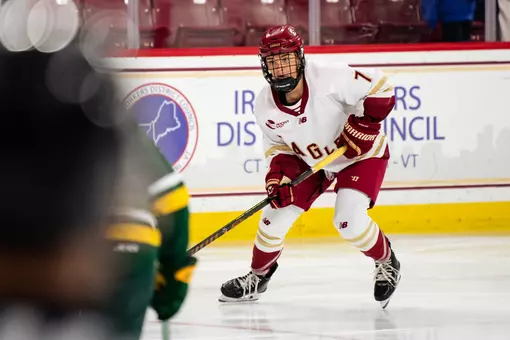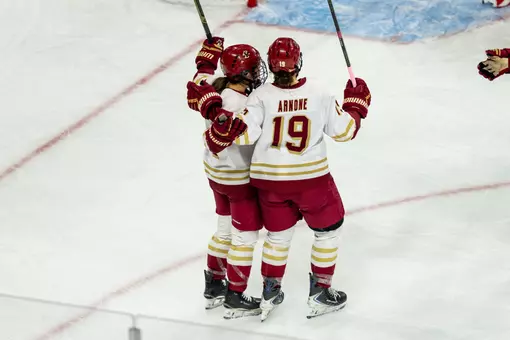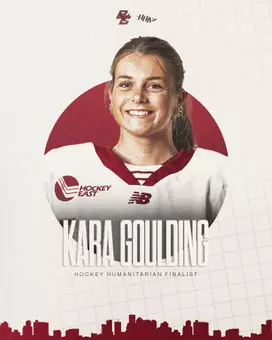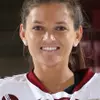Boston College Athletics
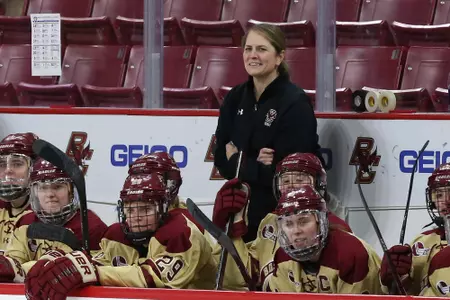
Photo by: John Quackenbos
Giving Congratulations For 300 Victories
February 15, 2019 | Women's Hockey, #ForBoston Files
Milestones are always worth a pause for celebration.
Asking coaches to reflect upon the past is one of the easiest ways to make them uncomfortable. They live at such a lightning-fast speed in the present tense that it's the only way to really derail their thought processes. There's such an intense focus on how to improve today - how to get a team to where it wants to be tomorrow - that it's virtually impossible to take five minutes to reflect upon something that happened even one week prior.
So imagine how much fun it becomes to tell a coach that her 300th career victory was just days away. It was just about two weeks ago, and I had dropped the number on Boston College women's hockey coach Katie Crowley.
"I honestly had no idea until you just told me," she said. "We become so focused on preparing for (the next game) that you don't really stop to think about it until someone mentions it."
I had a good laugh out of that because the coach was so dialed into talking about a hockey matchup. We had just finished talking about the team's rapid improvement in the second half of the season and what the last weeks of the regular season meant to this roster in particular. Then I shifted gears and dropped the 300, clearly catching her off-guard.
Milestones are always cause for celebration and reflection, so it's worth contextualizing what 300 wins means to a sport. Coach Crowley became just the 12th active women's college hockey coach to achieve the mark, regardless of divisional alignment. It places her into a tier occupied by longtime coaches Paul Flanagan and Jeff Kampersal, and it keeps her in the conversation with Minnesota's Brad Frost. It also creates an argument for her as one of the game's all-time greats, a discussion normally reserved for Harvard's Katey Stone or Wisconsin's Mark Johnson.
"We're just trying to do what we can to win a national championship," Crowley said. "Every year, it's a little bit different. I'm just really lucky that I get to share it with one of my best friends in Courtney Kennedy. We get to try and help this team win. We want to get this program to where it can be winning a national championship. Through all of that, it's been a blast. It's fun every day. I'm just really blessed."
It's a career that's seen its share of highlights over the past 20 years. Katie King graduated from Brown University in 1997 but remains the Bears' all-time leader in most offensive categories. She had 206 career points, scoring 123 goals. Her 40 goals was part of a 71-point season in 1996-1997, both of which still stand as pillars in Providence.
While it's true that those numbers aren't in the NCAA record book, it's also because she played in the era right before women's hockey exploded onto the national scene. The women's hockey national championship didn't exist before the American Women's College Hockey Alliance debuted in 1998. NCAA women's hockey didn't experience a genesis until 2001, largely due to the contributions of the era that preceded it.
That included the debut of the sport in the Olympics in 1998 and a gold medal run by a United States national team that featured Katie King. She finished the tournament with eight points and a plus-10 rating, scoring a hat trick in the Americans' 10-0 victory over Japan. The United States has never missed a medal in women's hockey, and Crowley further won a silver in 2002 and a bronze in 2006. In the latter two, she played alongside Courtney Kennedy, her current associate head coach and friend behind the bench at Boston College.
"It's crazy," senior captain Megan Keller, herself a gold medalist last year, said. "I've been so fortunate with coaches over the years. They're probably some of the best coaches I've ever had, and learning from two Olympians is why this team continues to succeed. It's a big reason why I am who I am as a player."
"Kinger and Court made practice every single day so much fun," former player Kenzie Kent said. "The light but intense energy they brought is what allowed all of us to be our genuine selves whenever we were on the ice or in the locker room. Their coaching styles brought out the best in their players, and it's what makes BC hockey so great. It's what made my four years playing hockey so special, and I attribute that to them."
It's an oddity to have multiple gold medalists on the Boston College roster, especially as coach and player. It creates a shared experience between player and coach, something that's shared within the entire roster. The Eagles lost three players last year to the United States national team, and Keller, fellow captain Kali Flanagan and Cayla Barnes all returned this year with shiny medals around their necks. But it never creates a caste system in the locker room; when the United States won gold, it was as if the entire Boston College community won gold with them.
"It's a credit to how well she's run her program for a number of years here with Courtney Kennedy side-by-side," men's hockey head coach Jerry York said. "They're two coaches who represent BC very well and have an unbelievable understanding of how hockey should be played at this level and further. They're producing some really quality individuals. In all my interactions with the student-athletes that they coach, I always come away impressed."
It wasn't always easy. The Boston College's first years in Hockey East produced two wins in conference, though that predated Coach Crowley. BC went to a Frozen Four in 2007, but two of her first three years were only at or around the .500 mark. Those years wound up laying a foundation for future success, which now includes annual preseason prognostications of Frozen Fours and national championships.
The funny thing is that this success can only be eclipsed. She's 18 victories away from Digit Murphy, who retired as the winningest Division I women's hockey coach and was Katie King's former coach at Brown. It's a little bit further to Shannon Miller, the former coach at Minnesota-Duluth. And there's the current jockeying with active coaches like Stone, Johnson or Mercyhurst's Michael Sisti. The 300 wins turns into 350 wins, which turns into 400 wins. The numbers and records, like points on a scoresheet, pile up, and the hope is that individual achievements become the byproduct of what will eventually be a number of national championships.
"It's been a great journey," Crowley said. "It's been a lot of fun. I really do feel lucky. We've had so much support from Jerry York, (current men's assistant coach) Mike Ayers and (former men's assistant coach) Greg Brown. All of the other coaches make us feel part of the greater Boston College community, and I feel very fortunate. We've grown this program, and we've had fun doing it. It wasn't easy at the beginning when we were 0-18-1 when I was a first-year assistant, but we kept grinding. We turned it around with help from others. We're really proud of it, and we want to keep building the program to where we can get to the highest point that we can."
So congratulations to Coach Katie Crowley on 300 career wins. I look forward to making you uncomfortable again in about 50 or so more games.
So imagine how much fun it becomes to tell a coach that her 300th career victory was just days away. It was just about two weeks ago, and I had dropped the number on Boston College women's hockey coach Katie Crowley.
"I honestly had no idea until you just told me," she said. "We become so focused on preparing for (the next game) that you don't really stop to think about it until someone mentions it."
I had a good laugh out of that because the coach was so dialed into talking about a hockey matchup. We had just finished talking about the team's rapid improvement in the second half of the season and what the last weeks of the regular season meant to this roster in particular. Then I shifted gears and dropped the 300, clearly catching her off-guard.
Milestones are always cause for celebration and reflection, so it's worth contextualizing what 300 wins means to a sport. Coach Crowley became just the 12th active women's college hockey coach to achieve the mark, regardless of divisional alignment. It places her into a tier occupied by longtime coaches Paul Flanagan and Jeff Kampersal, and it keeps her in the conversation with Minnesota's Brad Frost. It also creates an argument for her as one of the game's all-time greats, a discussion normally reserved for Harvard's Katey Stone or Wisconsin's Mark Johnson.
"We're just trying to do what we can to win a national championship," Crowley said. "Every year, it's a little bit different. I'm just really lucky that I get to share it with one of my best friends in Courtney Kennedy. We get to try and help this team win. We want to get this program to where it can be winning a national championship. Through all of that, it's been a blast. It's fun every day. I'm just really blessed."
It's a career that's seen its share of highlights over the past 20 years. Katie King graduated from Brown University in 1997 but remains the Bears' all-time leader in most offensive categories. She had 206 career points, scoring 123 goals. Her 40 goals was part of a 71-point season in 1996-1997, both of which still stand as pillars in Providence.
While it's true that those numbers aren't in the NCAA record book, it's also because she played in the era right before women's hockey exploded onto the national scene. The women's hockey national championship didn't exist before the American Women's College Hockey Alliance debuted in 1998. NCAA women's hockey didn't experience a genesis until 2001, largely due to the contributions of the era that preceded it.
That included the debut of the sport in the Olympics in 1998 and a gold medal run by a United States national team that featured Katie King. She finished the tournament with eight points and a plus-10 rating, scoring a hat trick in the Americans' 10-0 victory over Japan. The United States has never missed a medal in women's hockey, and Crowley further won a silver in 2002 and a bronze in 2006. In the latter two, she played alongside Courtney Kennedy, her current associate head coach and friend behind the bench at Boston College.
"It's crazy," senior captain Megan Keller, herself a gold medalist last year, said. "I've been so fortunate with coaches over the years. They're probably some of the best coaches I've ever had, and learning from two Olympians is why this team continues to succeed. It's a big reason why I am who I am as a player."
"Kinger and Court made practice every single day so much fun," former player Kenzie Kent said. "The light but intense energy they brought is what allowed all of us to be our genuine selves whenever we were on the ice or in the locker room. Their coaching styles brought out the best in their players, and it's what makes BC hockey so great. It's what made my four years playing hockey so special, and I attribute that to them."
It's an oddity to have multiple gold medalists on the Boston College roster, especially as coach and player. It creates a shared experience between player and coach, something that's shared within the entire roster. The Eagles lost three players last year to the United States national team, and Keller, fellow captain Kali Flanagan and Cayla Barnes all returned this year with shiny medals around their necks. But it never creates a caste system in the locker room; when the United States won gold, it was as if the entire Boston College community won gold with them.
"It's a credit to how well she's run her program for a number of years here with Courtney Kennedy side-by-side," men's hockey head coach Jerry York said. "They're two coaches who represent BC very well and have an unbelievable understanding of how hockey should be played at this level and further. They're producing some really quality individuals. In all my interactions with the student-athletes that they coach, I always come away impressed."
It wasn't always easy. The Boston College's first years in Hockey East produced two wins in conference, though that predated Coach Crowley. BC went to a Frozen Four in 2007, but two of her first three years were only at or around the .500 mark. Those years wound up laying a foundation for future success, which now includes annual preseason prognostications of Frozen Fours and national championships.
The funny thing is that this success can only be eclipsed. She's 18 victories away from Digit Murphy, who retired as the winningest Division I women's hockey coach and was Katie King's former coach at Brown. It's a little bit further to Shannon Miller, the former coach at Minnesota-Duluth. And there's the current jockeying with active coaches like Stone, Johnson or Mercyhurst's Michael Sisti. The 300 wins turns into 350 wins, which turns into 400 wins. The numbers and records, like points on a scoresheet, pile up, and the hope is that individual achievements become the byproduct of what will eventually be a number of national championships.
"It's been a great journey," Crowley said. "It's been a lot of fun. I really do feel lucky. We've had so much support from Jerry York, (current men's assistant coach) Mike Ayers and (former men's assistant coach) Greg Brown. All of the other coaches make us feel part of the greater Boston College community, and I feel very fortunate. We've grown this program, and we've had fun doing it. It wasn't easy at the beginning when we were 0-18-1 when I was a first-year assistant, but we kept grinding. We turned it around with help from others. We're really proud of it, and we want to keep building the program to where we can get to the highest point that we can."
So congratulations to Coach Katie Crowley on 300 career wins. I look forward to making you uncomfortable again in about 50 or so more games.
Players Mentioned
Eagles Spotlight: Kara Goulding
Tuesday, March 03
Eagles Spotlight: Kara Goulding
Tuesday, March 03
Women's Hockey: Mic'd Up with Alanna Devlin
Thursday, February 12
Mic'd Up with Alanna Devlin
Thursday, February 12

